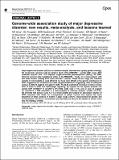Genome-Wide Association Study of Major Depressive Disorder: New Results, Meta-Analysis, and Lessons Learned

View/
Author
Wray, N R
Pergadia, M L
Blackwood, D H R
Penninx, B W J H
Nyholt, D R
MacIntyre, D J
McGhee, K A
Maclean, A W
Smit, J H
Hottenga, J J
Willemsen, G
Middeldorp, C M
de Geus, E J C
McGuffin, P
Hickie, I B
van den Oord, E J C G
Macgregor, S
McEvoy, B P
Medland, S E
Statham, D J
Henders, A K
Montgomery, G W
Boomsma, D I
Madden, P A F
Gordon, S. D.
Lewis, C. M.
Liu, J. Z.
Byrne, E. M.
Heath, A. C.
Martin, N. G.
Sullivan, P. F.
Note: Order does not necessarily reflect citation order of authors.
Published Version
https://doi.org/10.1038/mp.2010.109Metadata
Show full item recordCitation
Wray, N.R., M.L. Pergadia, D.H.R. Blackwood, B.W.J.H. Penninx, S.D. Gordon, D.R. Nyholt, S. Ripke, et al. 2012. Genome-wide association study of major depressive disorder: New results, meta-analysis, and lessons learned. Molecular Psychiatry 17(1): 36-48.Abstract
Major depressive disorder (MDD) is a common complex disorder with a partly genetic etiology. We conducted a genome-wide association study of the MDD2000+ sample (2431 cases, 3673 screened controls and >1 M imputed single-nucleotide polymorphisms (SNPs)). No SNPs achieved genome-wide significance either in the MDD2000+ study, or in meta-analysis with two other studies totaling 5763 cases and 6901 controls. These results imply that common variants of intermediate or large effect do not have main effects in the genetic architecture of MDD. Suggestive but notable results were (a) gene-based tests suggesting roles for adenylate cyclase 3 (ADCY3, 2p23.3) and galanin (GAL, 11q13.3); published functional evidence relates both of these to MDD and serotonergic signaling; (b) support for the bipolar disorder risk variant SNP rs1006737 in CACNA1C (P=0.020, odds ratio=1.10); and (c) lack of support for rs2251219, a SNP identified in a meta-analysis of affective disorder studies (P=0.51). We estimate that sample sizes 1.8- to 2.4-fold greater are needed for association studies of MDD compared with those for schizophrenia to detect variants that explain the same proportion of total variance in liability. Larger study cohorts characterized for genetic and environmental risk factors accumulated prospectively are likely to be needed to dissect more fully the etiology of MDD.Other Sources
http://www.ncbi.nlm.nih.gov/pmc/articles/PMC3252611/pdf/Terms of Use
This article is made available under the terms and conditions applicable to Other Posted Material, as set forth at http://nrs.harvard.edu/urn-3:HUL.InstRepos:dash.current.terms-of-use#LAACitable link to this page
http://nrs.harvard.edu/urn-3:HUL.InstRepos:10304391
Collections
- HMS Scholarly Articles [17921]
Contact administrator regarding this item (to report mistakes or request changes)


